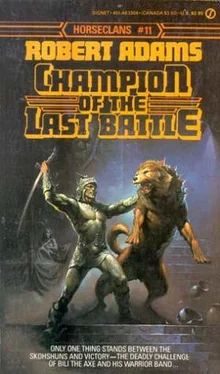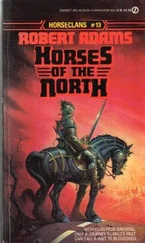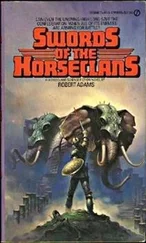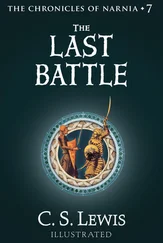“Gentlemen, I’m releasing you, as I promised I would do once my mission was accomplished. Where you go now is up to you, but I would imagine they could use your help over in that camp, what’s left of it. There are certain to be wounded men in there.”
Then he turned to the youngest of the Skohshuns, a peglegged boy whose face looked somewhat older than his chronological age. “Ensign Thomas Grey, please convey upon your next meeting with your mother, the Lady Pamela Grey, my sincerest regards and my best wishes for her future happiness. She is a splendid woman, sir, a true lady in every conceivable way. Had I met a woman like her long, long, long ago ... well, never mind. God speed you safely home, gentlemen, all of you.”
In the early evening of the day of that duel interrupted by fiery, deadly thunders, Duke Bili the Axe again occupied his accustomed place at the head of the table of the royal councilors of the Kingdom of New Kuhmbuhluhn, but that table and the chamber itself were both far more crowded than was usual. Extra chairs and stools had been lugged in from hither and yon, space made at the table sides to seat twice as many men, with others ranged against the walls on stools and a brace of benches.
They had all just heard what had really happened to drive them and their followers, willy-nilly, up here into New Kuhmbuhluhnburk that afternoon. Those who had recounted the fantastical tale—a one-legged boy-warrior a few years Bili’s junior and a brace of Skohshun officer-gallopers, all of whom had been prisoners of the strange, alien force which had wrought such havoc—had been sincerely thanked and dismissed from the chamber. The first to speak, then, was Bili.
“Well, gentlemen, at least we now know the truth of that scary business down there today. The Eastern Confederation, of which my Duchy of Morguhn is a vassal state, has suffered much in recent years from the sinister plottings and incursions of those damned Witchmen, and I’m right sorry to see them this far west. But they seem to thrive best where there is warfare and dissension, nor are they at all loath to foment chaotic conditions where none formerly existed. They cannot seem to exist in a land of peace and order, and so, if you Kuhmbuhluhn and Skohshun folk don’t want them back in your laps again, it is imperative that you settle your differences and begin to live amicably, one with the other.”
Noting the dark, sullen glances at each other of the two, previously warring races, the young commander went on to say, “Understand, gentlemen, I don’t give a real damn whether or not you all chop each other into gobbets, once I am gone. It’s none of my affair, to speak true. My contracts all are discharged and as soon as I can gather all my followers and set them on the march, I mean to recross the mountains, collect the cubs—human and feline—that we left in Sandee’s Cot last spring, and return back whence we came.
“You men all are my elders, and, it is bruited about at least, age imparts wisdom. Surely you men are wise enough to see that you must reconcile your differences and merge your two races into one, else you will soon be easy prey to the Witchmen or to any other united and disciplined force that comes your way. Such a race are your eastern neighbors, the Ahrmehnee stahn, nor can I truly believe that you have seen the last of the outlaw-Ganiks, the cannibals.
“I have talked with Sir Ahrthur, Sir Djahn, Sir Djaimz and Captain Baron Devernee, this day, and all agree that this war has been an ill-starred business from start to date. They admit to being as much at fault for the inception of hostilities as were you Kuhmbuhluhners, which is, I trow, a good place to commence the ending of it.
“They have no desire to extirpate the folk of New Kuhmbuhluhn. They are only seeking land to farm and live upon and raise their families on, having been driven from off their own lands by a hostile invader. Now, in the wake of the departures of the Ganiks, there are huge tracts of empty, tenantless, but potentially rich land south of the mountains, and there are nowhere near to approaching enough New Kuhmbuhluhn folk to adequately settle and work them. You know that and I know that, no matter how much you may protest the contrary.
“Now, the House of Mahrloh is extinct, so there is presently no king in New Kuhmbuhluhn, and, barring a miracle, I cannot imagine you councilors soon agreeing upon one of your number for that office.”
Archcount Sir Daifid Howuh sneeringly asked, “And I suppose that your grace expects us to choose and try to live under one of these damned savage brutes of Skohshuns? Methinks your grace today took some stray buffet that addled your grace’s brains. A Skohshun king of New Kuhmbuhluhn, indeed!”
Bili shook his shaven head. “No, Archcount Howuh, a king of any sort—Kuhmbuhluhner or Skohshun—was not really that of which I was thinking.”
“Well, what the hell else is there, sir duke,” demanded Duke Klyv Wahrtuhn, exasperatedly, “save anarchy?”
Bili steepled his thick, callused fingers and gazed over their tips at the men ranged along the two sides of the table. “There is the path that the Republic of Eeree took long ago when faced with similar difficulties; now that republic is every bit as strong and as prosperous as the kingdoms of Harzburk or Pitzburk.”
“Ah, yes,” responded Archcount Howuh, “I think I recall hearing tales from Old Kuhmbuhluhn regarding that strangely governed state. Please, your grace of Morguhn, say on.”
Naturally, it was not as easy as all that. Sectarian differences ran too deep and wide in both New Kuhmbuhluhn and Skohshun, not to even mention the basic hostility of the one race for the other in the wake of the recent unpleasantnesses. It all required the best part of two weeks of almost ceaseless, day- and nightlong discussions, arguments, name-callings, shouting matches, table poundings, wall poundings and other clear evidences of strong wills and adult temper tantrums. And it all devolved into no worse only because Bili wisely barred even the smallest, least innocuous edge weapons from the chamber and tried to see to it that the various factions were lodged as far from one another as was possible in the overcrowded palace and city.
To help in relieving some of this overcrowding, while at one and the same time keeping the former combatants—Skohshun and Kuhmbuhluhner—living cheek by jowl, Bili quartered the larger part of his own squadron and the reinforcements led by Sir Geros and Sir Djim in the much-battered camp of the former besiegers. He justified his actions with the excuse that there simply was insufficient space for so many horses and ponies in the keep stables and that the animals would, in any case, be happier and healthier grazing on the plain.
He retained his staff and that of Sir Geros in the city, along with enough of his veteran cavalry—mostly Moon Maidens and Freefighters of the old Morguhn Company—to provide him a loyal nucleus did the negotiations get out of hand and overt warfare between the Kuhmbuhluhn nobility and the Skohshun officers recommence.
Sight of a Kleesahk in the city confines was a rarity for a week and more after the “battle,” Pah-Elmuh having led the huge hominids down to the battle site and the ruined camp as soon as he had heard that there were hundreds of sick and hurt and wounded men and horses in and about the area, all in crying need of care and healing.
Hard beset as he found himself, Bili saw it imperative to delegate authority and duties. All of the operational and logistical planning of the return march—first to Sandee’s Cot, then through the southern tribal lands of the Ahrmehnee stahn and so on east through the Thoheekahtohn of Vawn into his own Thoheekahtohn of Morguhn—he piled onto the combined staffs. Governance of the fortress city of New Kuhmbuhluhnburk he placed in the capable hands of Sir Yoo Folsom. The overlord of Sir Yoo, Count Djohsehf Brahk, had had the misfortune to have one of the missiles thrown by the weapons of the Witchmen land squarely upon him (had the occurrence not been witnessed, no one would ever have known exactly what had happened to him, so little of him and his horse had remained of an identifiable nature), and, before all was done, Bili intended to see the royal council about the now-vacant peerage.
Читать дальше












